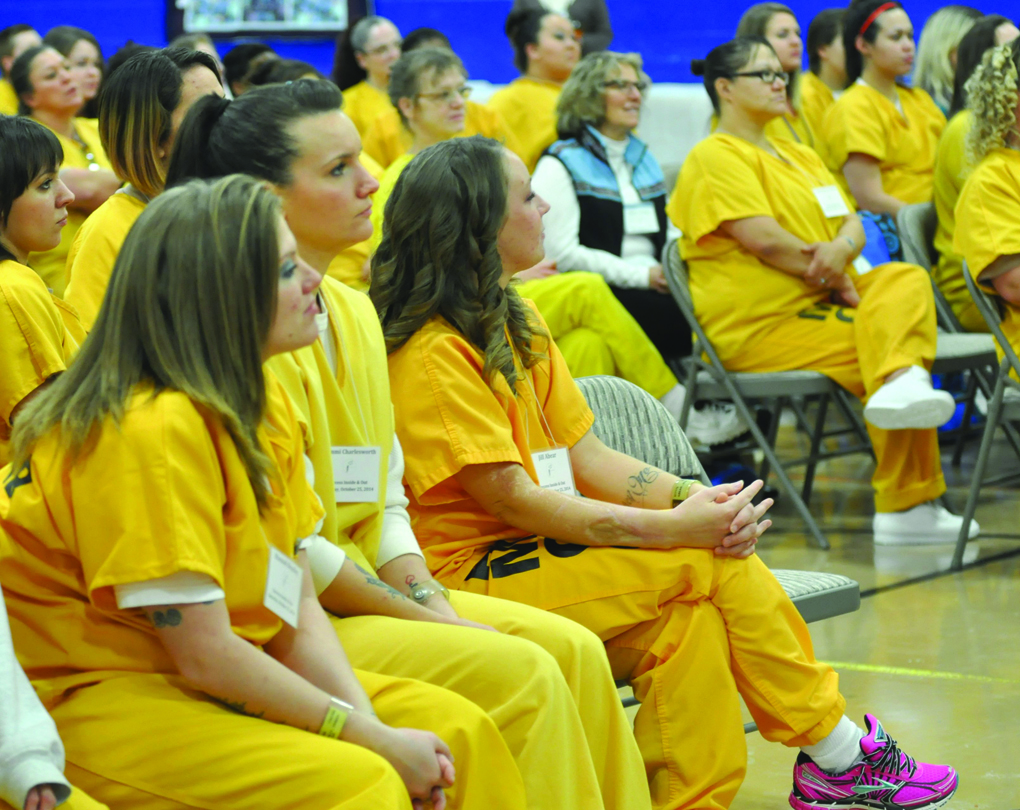EAGLE RIVER — The classroom at Hiland Mountain Correctional Center was serene and airy with silver-soft light filtering across the room. Bright nature murals sprawl across the walls and large windows overlook a tree-filled courtyard.
Suddenly, women shuffled in, a dozen sneakered feet, a dozen yellow-orange pants and loose shirts with HMCC stamped across the back in bold, black letters.
The women were Hiland inmates attending workshop sessions as part of the Success Inside & Out agenda. In its ninth year, the program highlights tips and coping strategies for pre-release inmates, offering panels and classes in such areas as probation tips, educational horizons, child custody and re-entry support.
Hands down, the most popular event was the fashion show, which offered do’s and don’ts for prospective job seekers. Six inmate models walked the runway in everything from a too-short and too-tight skirt (a definite no) to a sleekly cut skirt and matching jacket (yes, please).
Yet it was the workshops, not the runway, that offered life-changing skills and potentials.
Kathleen Madden facilitated “Inspire Yourself to Action in Your New Life,” a hands-on class prodding inmates to ask a few hard, and honest, questions: Where do they want to be in five years and, more importantly, who do they want to be?
Ann Severson needed inspiration. She’s slated for release soon and needs something to keep her going, to keep her strong.
“It’s hard to say no,” she said.
Michelle Schmidt wanted to finish college, find a way to support a family and continue attending Narcotics Anonymous meetings.
Casonya Cuevas was looking for meaning.
“I want to actually be able to say that I have lived, and not merely existed,” she said.
Powerful stories were told in “Probation Tips for Success,” an afternoon panel that featured former Hiland inmates Dana Hilbish and Rachel Burkhart, along with Lana Grist of the Department of Corrections Division of Probation and Parole.
Hilbish and Burkhart both stressed that the transition from prison to outside life was far from easy.
Hilbish, who served 21 years for murder and tampering with evidence, was released last January. The only thing keeping her back out of prison, she said, is her sobriety.
“I live in the moment,” she said, “and that’s where I am today.”
Finding a good support group is the key to making it, she said.
“I had no support network,” she said. “I had to start from within.”
She networked with people through the prison’s orchestra program.
“I picked up a cello and that led me to a group of friends that led me to another group of friends,” she said.
She secured her present job at Fire Island Bakeshop while still playing in the prison orchestra.
“Part of it was luck, and part of it was choices,” she said.
Burkhart’s story was similar: Substance abuse and bad decisions steered her toward numerous prison stints.
“I knew I had to completely change my surroundings, change my friends. I had to let them go, and it was the hardest thing I’ve ever done,” she said.
It was a slow process, not an easy thing for someone used to a hard and fast lifestyle. Her life was further hampered by the ankle monitor she was forced to wear.
“About the only thing I could do when I got out was go pee in a cup and go to meetings and stay home and watch TV,” she said.
Those restrictions forced her to do something she had never done before: Slow down and think about what she wanted in life.
She’s been clean now for four years and works as a legal assistant for a law firm manager.
“I never knew how to be a strong and self-sufficient woman,” she said. “I only knew how to hustle and make it on the street. Getting out of my comfort zone saved my life.”
The afternoon ended with journal readings from Martha Amore’s writing workshop participants, who shared short essays about drug addiction, losing custody of children and shuffling in and out of jail.
“Here stands a beautiful and strong rose that grew from concrete,” Melina Dayer said, and her voice trembled with tears.
Cinthia Ritchie is the editor of the Chugiak-Eagle River Star.



